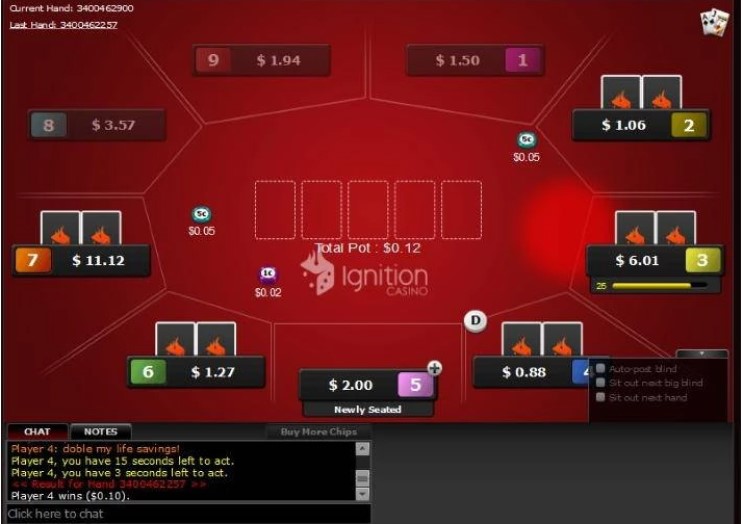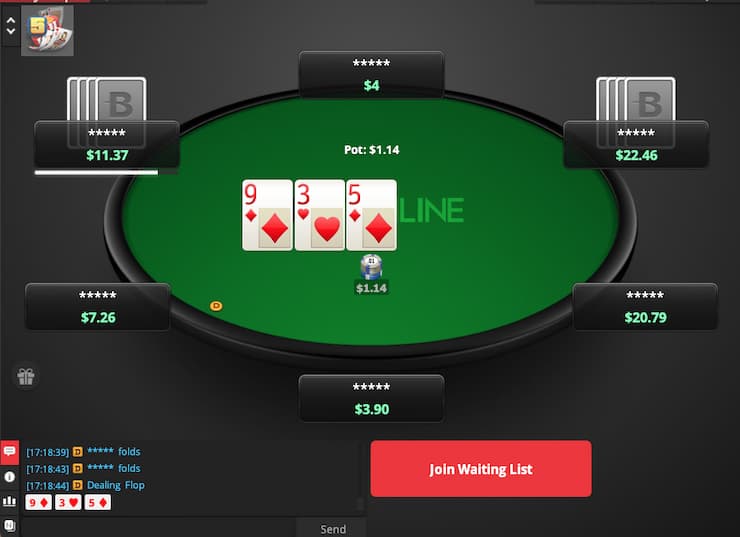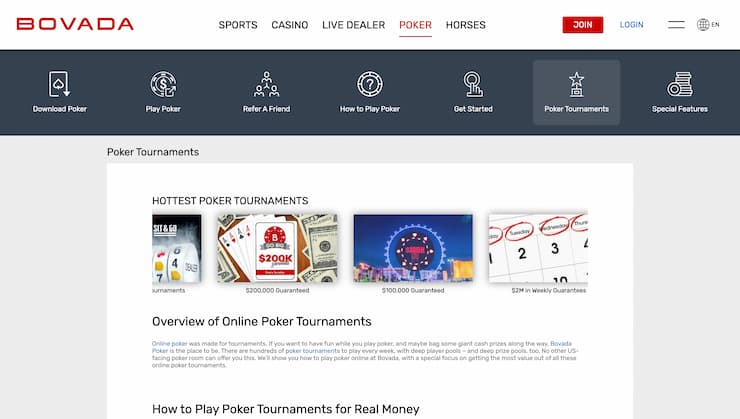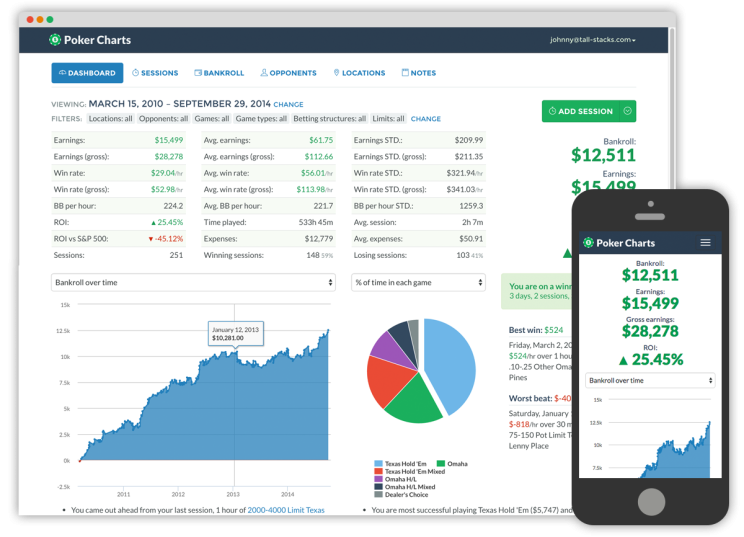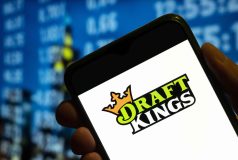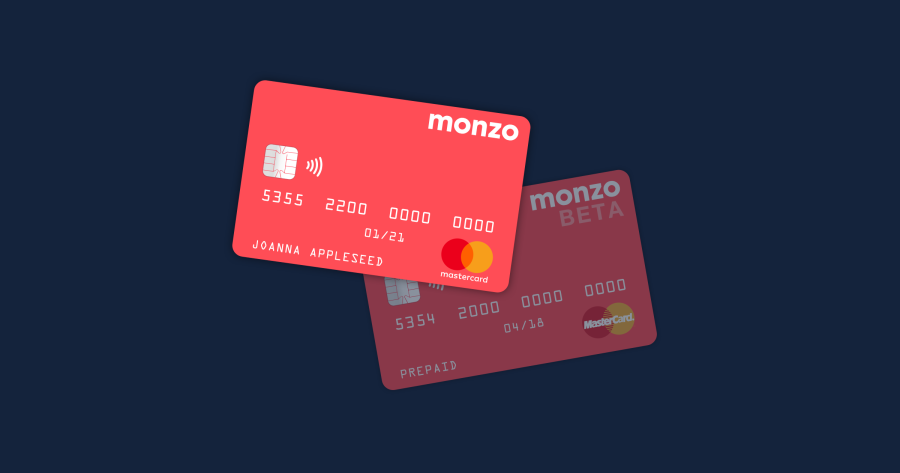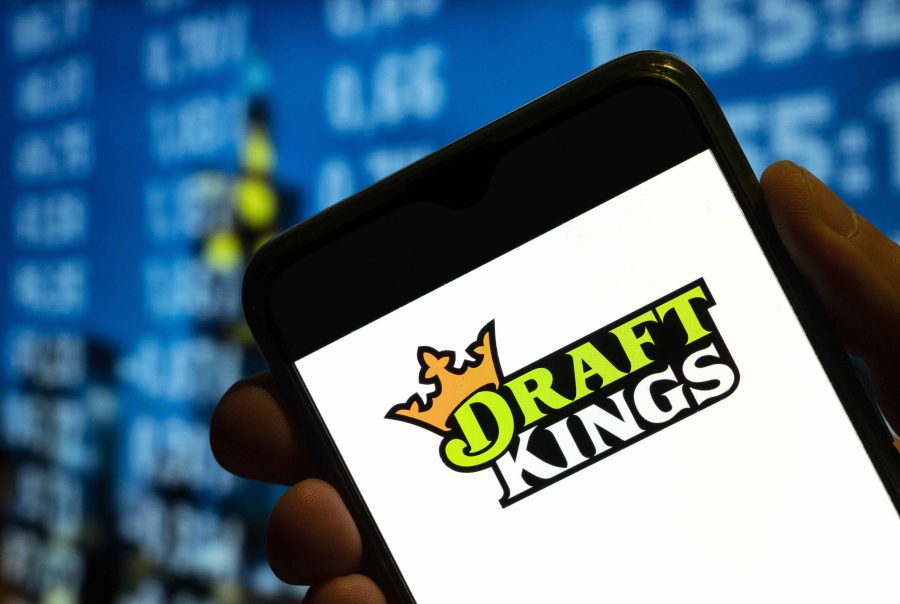Every aspiring player needs to master the fundamentals of poker bankroll management. Without any money management skills, you’ll never move up the ranks and stay there. Here’s everything you need to devise your own bankroll management poker strategy and improve your results.
What is Bankroll Management in Poker?
Bankroll management in poker is a set of rules that govern the stakes you play based on the money you have. For example, if you’ve got $1,000 to play poker with, a bankroll management poker strategy would tell you which cash games or tournaments are appropriate for your budget.
We’ll give you the specifics of how to build a bankroll and the amount of money you need to play at certain stakes later on. First, it’s important to define what a bankroll is.
A bankroll isn’t all the money you’ve got in the world. It should be disposable income that you can comfortably lose. Put simply, bankroll bucks should be distinct from the money you need for other parts of your life.
Pros of Managing Your Poker Budget
- You add structure to your game
- You reduce the risk of going broke
- It helps you get through tough times
- It’s psychologically reassuring to have a plan
- You don’t play in a games that are beyond your skill level
100% Up to $1,000 Poker Welcome Bonus 100% Up to $1,000 Poker Welcome Bonus
Building a Bigger Bankroll in Poker
Bulk up your bankroll so you can move up the ranks in poker with these 5 top tips:
Start From Zero
The beauty of playing poker online is that there are tons of ways to do it for free. In fact, not only can you play online poker games for free, you can win cash prizes. Our recommended online poker sites run daily freerolls that allow you to ante up without spending a cent and win real-money prizes.Claim Bonuses
Online poker bonuses are another way you can start from zero. Poker sites run a variety of promotions, including welcome bonuses, reload offers, free tournament ticket giveaways, and loyalty programs. All of these promotions can get you free bankroll bucks that you can use to move up the poker ladder.Go Slow, It’s Not a Race
Poker is one long game. There’s no need to treat it like a race. If you can accept that poker is a long-term game, it’s much easier to progress at a realistic pace.Skills Over Limits
There are certain minimum skill standards you should aim for but you shouldn’t move up just because you have “enough” money. Unless you’re a prodigy, the chances are you’re not skilled enough to compete in $2/$4 cash games. That’s why you should prioritize skills over limits. Ask yourself if you can beat the games you want to play, then consider if you’ve got enough money.Shoot Your Shot (When It’s Appropriate)
A lot of people ask about taking shots when they’re discussing how to build a bankroll. This is a legitimate strategy that many successful players have used over the years. It’s based on the idea that you can jump up a level or two even if you don’t have enough money. There are three questions to ask yourself before you take a shot: are you skilled enough? Are the poker games good and exploitable? Will a failed attempt decimate your bankroll? Give a positive answer to all three of those questions, and you can consider taking a shot.
Suggested Bankroll Bucks in Online Poker
Poker bankroll management is a general term for the financial constraints we use to determine which games we can and can’t play. However, as we’re about to explain, there isn’t a single set of universal rules.
For example, online poker bankroll management is slightly different from live bankroll handling because, in general, online games are tougher. Therefore, you need a more conservative bankroll management poker strategy when you’re playing online compared to live.
In the same way that you need to enter different variables into your bankroll calculator based on where you play, you also need to adjust your settings based on the type of game you’re playing. Specifically, there are different poker money management rules for cash games and tournaments.
We’ll explain why there’s a fundamental difference between cash game and poker tournament bankroll management in a moment. Before that, the tables below show the recommended amount of money you need to play cash games, tournaments, and Sit & Gos (SNGs) at various stakes:
Cash Game Bankroll Management Recommendations
The general rule for cash games is 30 to 50 buy-ins. Some people suggest being more conservative, particularly if you’re playing online games. However, 30 to 50 is a solid starting point.
One thing to note is that you use the maximum table buy-in as the basis of your calculation. For example, the maximum buy-in for a $0.50/$1 poker table is 100x the big blind i.e., $1 x 100 = $100. Plug that number into your poker bankroll calculator, and it will give you a figure between $3,000 and $5,000, i.e., 100 x 30 / 100 x 50.
| Poker Table Stakes | Suggested Bankroll |
| $0.01/$0.02 (aka $2 max buy-in games) | $30-$50 |
| $0.02/$0.04 (aka $4 max buy-in games) | $60-$100 |
| $0.05/$0.10 (aka $10 max buy-in games) | $300-$500 |
| $0.10/$0.25 (aka $25 max buy-in games) | $750-$1,000 |
| $0.25/$0.50 (aka $50 max buy-in games) | $1,500-$2,500 |
| $0.50/$1.00 (aka $100 max buy-in games) | $3,000-$5,000 |
| $1/$2 (aka $200 max buy-in games) | $6,000-$10,000 |
| $2/$4 (aka $400 max buy-in games) | $12,000-$20,000 |
| $3/$6 (aka $600 max buy-in games) | $18,000-$30,000 |
| $5/$10 (aka $1,000 max buy-in games) | $30,000-$50,000 |
The above recommendations are intended for Pot Limit and No Limit cash games. There is scope to be slightly more liberal if you’re playing Limit poker because the games, in general, aren’t as volatile.
Let’s imagine you have a poker roll of $1,000. That puts you at the top end of the $0.10/$0.25 range for Pot Limit and No Limit poker games. It’s worth considering a shot at $0.25/$0.50 and, possibly, $0.50/$1 if it’s a good Limit cash game.
Poker Tournament Bankroll Management Recommendations
Poker tournament bankroll management rules are based on the entry fees you pay. All live and online poker tournaments have a secondary fee known as the rake. For example, a $10 tournament will cost $10 + $1 = $11. You don’t need to worry about this. The poker tournament bankroll table below takes this into account.
| Tournament Entry Fee | Suggested Bankroll |
| $0.01 to $0.50 | $50 |
| $1 | $100 |
| $2 | $200 |
| $5 | $500-$1,000 |
| $10 | $1,000-$2,000 |
| $22 | $2,200-$4,400 |
| $33 | $3,300-$6,600 |
| $50 | $5,000-$10,000 |
| $100 | $10,000-$20,000 |
| $225 | $22,500-$45,000 |
| $500 | $50,000-$100,000 |
| $1,000 | $100,000-$200,000 |
You’ll notice that our bankroll management rules change as we move from $5 MTTs to $10 tournaments. The general rule for poker tournaments is that you need at least 100 buy-ins. This rule applies at all levels.
However, as you move up the limits, you may need to become more conservative and edge toward the 200 buy-in mark. The simple reason for this is that MTTs get harder. They’re volatile by their very nature, so when you combine this with more skilled players, it gets harder to win. That’s why it’s wise to be more conservative as you move from micro to low-stakes MTTs and beyond.
SNG Bankroll Management Recommendations
SNGs are self-contained tournaments, so the bankroll management rules are similar to the ones we’ve just outlined. However, because you’re competing against fewer players in these tournaments, you don’t have to be quite as conservative. That’s why a suitable SNG poker roll is anywhere between 50 and 75 buy-ins for the games you want to play.
| SNG Entry Fee | Recommended Bankroll |
| $0.10 | $5 to $7.50 |
| $0.25 | $12.50 to $18.75 |
| $0.50 | $50 to $37.50 |
| $1 | $50 to $75 |
| $2 | $100 to $150 |
| $5 | $250 to $375 |
| $10 | $500 to $750 |
| $25 | $1,250 to $1,875 |
| $50 | $2,500 to $3,750 |
| $100 | $5,000 to $7,500 |
| $200 | $10,000 to $15,000 |
| $300 | $15,000 to $22,500 |
| $500 | $25,000 to $37,500 |
| $1,000 | $50,000 to $75,000 |
Our previous point about tournaments getting harder to beat as you move up the levels applies in this situation as well. Therefore, if you’re thinking about how to build a bankroll with the least risk possible, become increasingly more conservative as you move up the ranks.
Why Do Bankroll Management Poker Rules Differ?
We said before that poker bankroll management rules differ depending on whether you play live or online and, in turn, the types of games you play. The reason the recommended cash amounts vary between cash games, tournaments, and SNGs is volatility.
Cash games aren’t as volatile as tournaments. That’s a general statement. We’re not saying you won’t experience wild swings in cash games because it’s entirely possible. The point we’re making is that you have more control when it comes to cash games because you can leave at any point.
When you enter an online poker tournament, you pay the buy-in, and you either survive long enough to make money or you don’t. The same goes for SNGs.
In a cash game, you sit down at a poker table and leave whenever you want. That means you could win a big all-in and leave straight away to lock up a profit. This ability to control the length of your sessions means you don’t need to be as conservative with your bankroll management rules in cash games as you do in tournaments.
Poker Bankroll Management - Moving Up Gears
An important part of our bankroll management poker strategy is skills over limits. To repeat our previous point, you shouldn’t move up just because you’ve got enough money. You can never know for sure if you’re skilled enough to move up to a new level, but there is a metric you can use. This metric is your win rate.
The process is fairly simple:
- You track your win rate at the level you’re playing using a product such as PokerTracker or Holdem Manager.
- You compare that win rate to what other successful players have achieved over time.
- If you’re a winning player at your current level, consider moving up.
Poker win rates are calculated by looking at the number of big blinds you win, on average, per 100 hands you play, aka bb/100. You need a sample size of at least 50,000 hands to get an accurate representation of your win rate. To be more accurate, you should have a sample size of at least 100,000 hands.
What’s a good win rate in poker? It’s hard to give a definite answer here, but here’s a general breakdown of win rates and what they might tell you:
- <1bb/100 = you’re a losing or break-even player at your current level and shouldn’t move up
- 1bb to 4bb/100 = you’re a solid player at your current level and can think about moving up
- 5bb to 9bb/100 = you’re a strong player at your current level and should move up
As we’ve stressed throughout this online poker bankroll management guide, there are no hard and fast rules. You don’t have to move up if you’re winning 9bb/100 at a certain level. However, if you’re someone who wants to climb the ranks, these are the win rates you should be aiming for.
Start moving through the poker gears today at Bovada.
100% up to $500 Deposit Bonus 100% up to $500 Deposit Bonus
Top 5 Bankroll Management Tips
Here are 5 online poker bankroll management tips you can use to maximize your time and enjoyment at the tables:
#1. Always Keep Your Bankroll Separate
Perhaps the biggest mistake people make when it comes to bankroll management is not keeping their poker roll separate from other money they have. Indeed, that’s why people often ask the question: how much is a bankroll? The answer isn’t a cash amount, it’s any amount of money you can afford to lose.
That doesn’t mean you want to or will lose. It’s more a reflection of the money’s status, i.e., your life wouldn’t be materially affected if you lose your poker roll. That’s why your bankroll should always be separate from the money you have set aside for other parts of life.
#2. Always Have More Than You Need
Using a poker bankroll calculator to determine how much money you need for a certain level is great, but don’t live and die by those numbers. Poker can be unpredictable, and there will be times when negative variance deals you a series of unexpected losses. Having more money than you need will help you get through these times without having to drop down a level or two.
#3. It’s OK to Move Down
The goal in poker is to move up the stakes and win as much money as possible. Wrapped up in this goal is the concept of preservation. As much as you’re aiming to win money, you’re also trying to preserve the bankroll bucks you’ve already got. Therefore, if you’ve hit a rough patch and your bankroll is dwindling, don’t be afraid to play lower-stakes games until you recover.
#4. Study, Study, Study
There’s little value in learning how to build a bankroll if you’re not prepared to study other aspects of the game. You’ll never move up the ranks by having a solid bankroll management poker strategy and nothing else. Poker is a multifaceted game that requires a variety of skills, so make sure you take the time to study the different types of poker and strategy concepts, such as value betting and bluffing.
#5. Play Smart and Be Responsible
The whole point of bankroll management is to give you a framework within which to play smart, sensible poker. Winning is great, but poker should be fun. The only way to enjoy the process of playing is to do it without any financial stress.
You can only reduce the amount of financial stress you experience if you have a solid grasp of poker money management. Therefore, if you can master bankroll management, you’ll give yourself the best chance of having fun while playing responsibly. If things ever feel like they’re getting out of hand, contact a problem gambling organization such as GamblingTherapy.org.
Poker Bankroll Tools & Software
Here are three pieces of software that can help tournament players, micro-stakes grinders, and cash game players to get ahead:
PokerTracker
This piece of software is what professional poker players use. It tracks every hand you play so you can establish your win rate, store results, and get stats on other players. You can use it to identify leaks in your game and when it’s time to move up or down a level.
PokerCharts
(Source: Poker Charts)
Track and log your results to find out where you’re winning or losing in cash or multi-table tournaments. The great thing about PokerCharts is that it creates handy graphs so you can quickly analyze data.
Poker Bankroll Tracker
(Source: Poker Bankroll Tracker)
This mobile app allows you to record live or online sessions, even at a smaller bankroll. As well as an odds calculator, payout calculator, and statistics, this app has a hand re-player that allows you to share sessions with your friends.
Read More About Online Poker
- Best Offshore Poker Sites
- A Complete Guide to Online Gambling
- How to Win in Poker
- Basics of How to Play Poker
- Beginners’ Online Poker Strategy Guide
Final Thoughts
Poker bankroll management is the foundation of any winning strategy. Whether you're a tournament or cash game player, you need to look after your money and be patient. With the right amount of skill and timing, you’ve got a great shot at climbing the ladder as a winning No Limit Hold'em player.
Start with free online poker games at BetWhale today.
250% Bonus For Slots, Cards & Table Games 250% Bonus For Slots, Cards & Table Games
FAQs
How much is a bankroll in poker?
How do you build a poker bankroll?
How do I handle variance in poker?
What is the best advice for good poker bankroll management?
Responsible Gambling
Never gamble more than you can afford to lose. You should play online poker for fun and never put yourself in financial or psychological danger. Learn more about these things and more in our responsible gambling guide.
Resources

